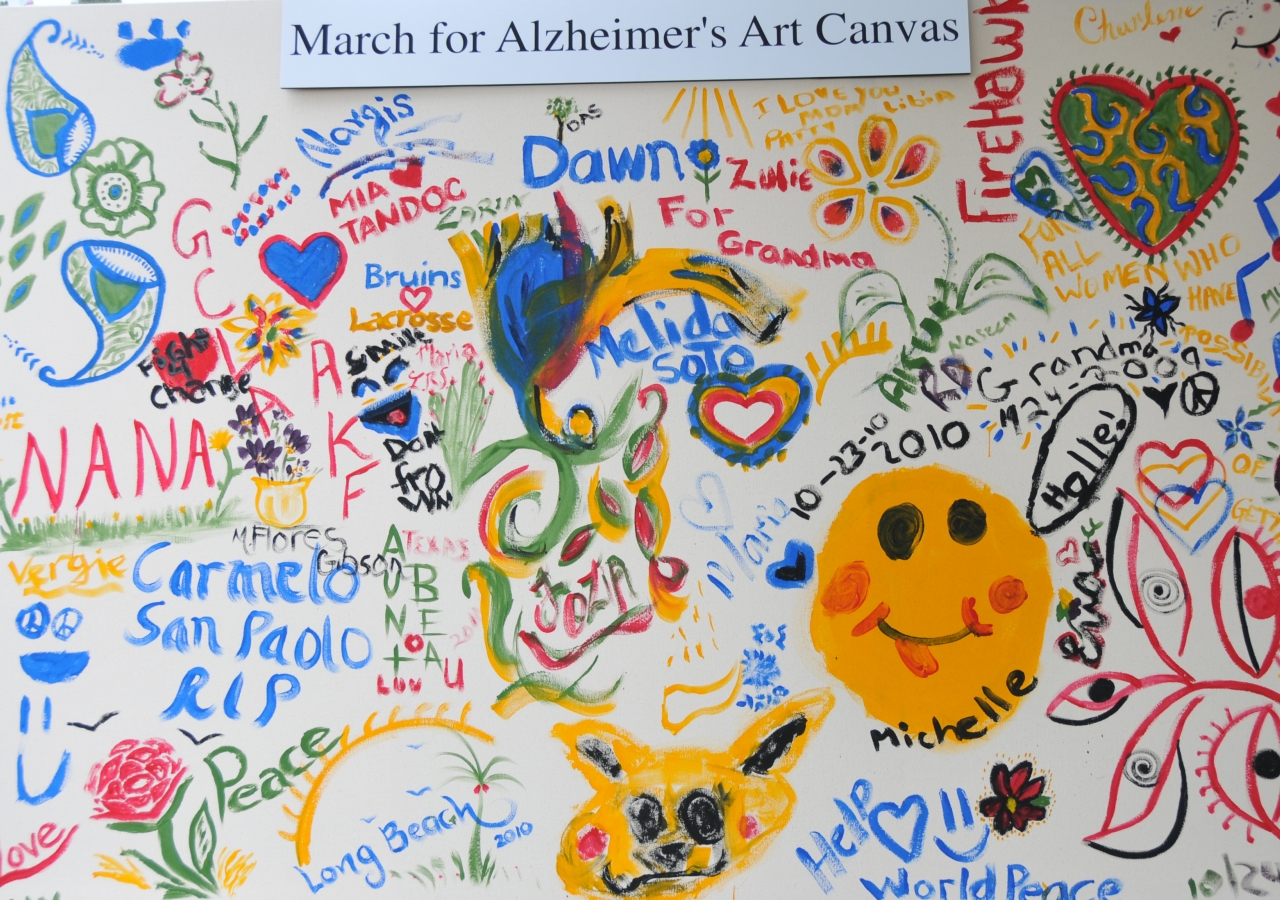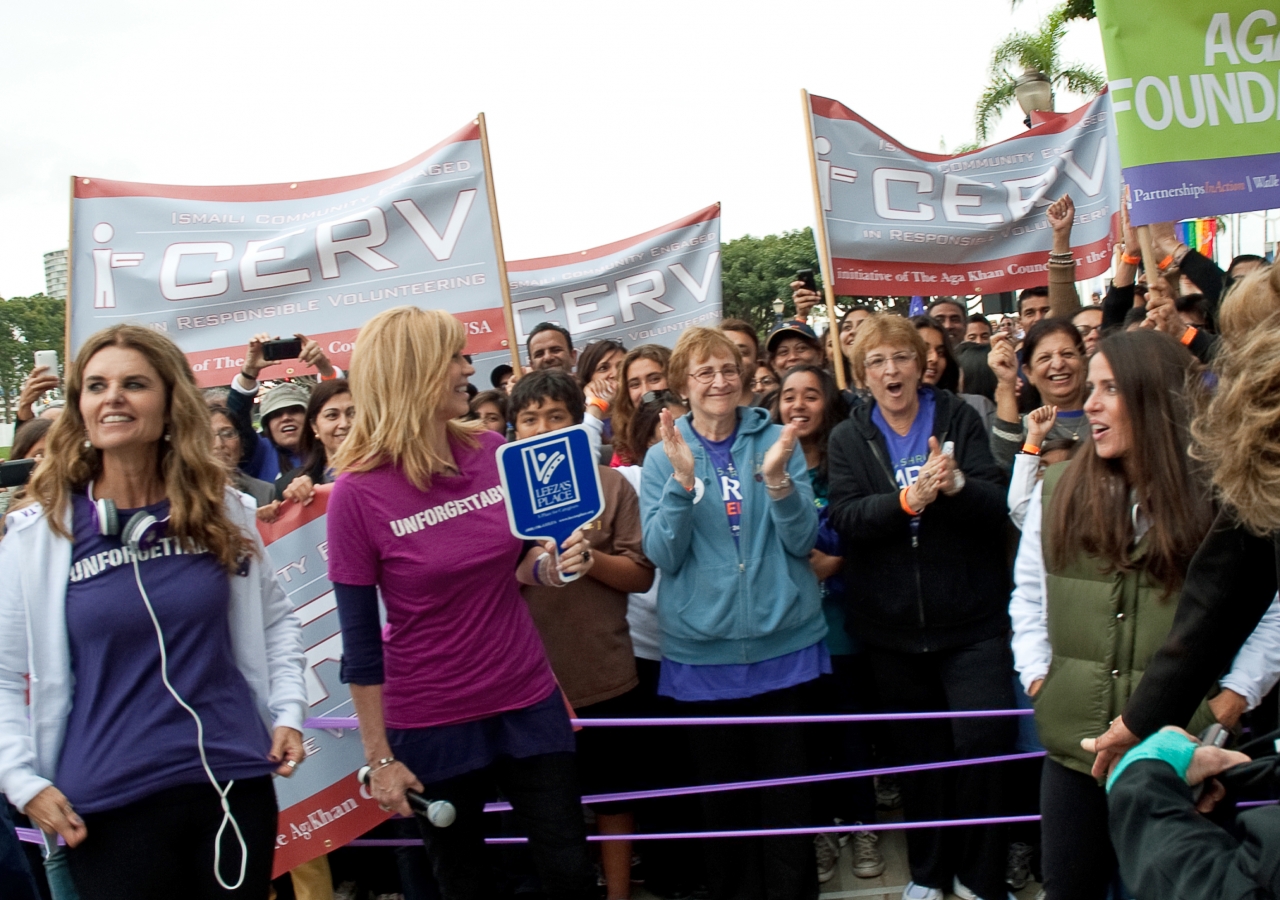There is something about a blank canvas that begs to be filled.
John Locke, the famous 17th century English philosopher, believed that the mind begins like a tabula rasa – devoid of content – that is coloured by life's experiences, skills and memories. But what happens when those colours begin to slowly fade away?
This is a frightening reality for aging patients living with Alzheimer's disease, a degenerative illness of the brain that affects memory, thinking and behaviour. The most common form of dementia, Alzheimer's affects more than 27 million people worldwide and there is no known cure. Art therapy provides families of patients with new ways to fill the blank spaces caused by memory loss.
At Maria Shriver's March on Alzheimer's held at Long Beach, California on 24 October 2010, two large communal canvases served as creative outlets for those who visited the booth on “Art Therapy and Alzheimer's” hosted by the Ismaili Council for the USA. The March was the inaugural event for the 2010 Women's Conference sponsored by the First Lady of California, Maria Shriver.
The canvases drew a large crowd of patients and family members, some of whom experienced emotional moments as they painted messages to their loved ones suffering from Alzheimer's.
 A pair of youth sign the “March for Alzheimer's Art Canvas” at the Ismaili community booth of Maria Shriver's March on Alzheimer's held at Long Beach, California in October 2010. Shams Soomar
A pair of youth sign the “March for Alzheimer's Art Canvas” at the Ismaili community booth of Maria Shriver's March on Alzheimer's held at Long Beach, California in October 2010. Shams Soomar“I was moved by the Ismaili community's involvement,” says Fauzia Mulji, a Jamati member who lost her mother after a 13½-year long struggle with Alzheimer's. “On the canvas, I drew a tree bearing fruit with my mother's name, Zareen, on top and mine below, alongside teardrops of her blessings.”
The booth offered a creative way to deal with the hopes and fears of living with this debilitating illness. Participants also engaged in interactive activities with family members to create other smaller pieces of artwork.
Inspired by the documentary film I Remember Better When I Paint (2009) which explores the positive impact of creative therapies on people with Alzheimer's disease, the Council booth showcased the importance of the art as a therapeutic outlet for patients. A clip from the movie explained how parts of the brain that trigger creativity stay intact until the end-stages of the illness, and research shows that Alzheimer's patients can creatively tap into the emotional capacities still active in their brain when provided art supplies. Thus art becomes a reaffirming way to communicate with loved ones losing their precious memories.
For Shriver, the event had deep emotional connections. Her father, Sargent Shriver, was diagnosed with Alzheimer's in 2003. Shriver has since become an advocate for Alzheimer's awareness and research. “This is a disease that knows no age boundaries and knows no economic boundaries,” she told the crowd at the event. “It's everyone's disease.”
So it seems. In the United States alone, more than 5 million Americans and 13 per cent of those over 65 years of age suffer from Alzheimer's.
 California Governor Arnold Schwarzenegger walking with celebrities at Maria Shriver's March on Alzheimer's. The Ismaili community's I-CERV team – which was the largest team at the event – is gathered behind them. Malik Hashim
California Governor Arnold Schwarzenegger walking with celebrities at Maria Shriver's March on Alzheimer's. The Ismaili community's I-CERV team – which was the largest team at the event – is gathered behind them. Malik HashimShriver visited the Ismaili Council booth where she was greeted by Dr Shaheen Kassim-Lakha, President of the Ismaili Council for the Western USA. She commended the Ismaili community for their support at the event and for implementing programmes for the elderly. Shriver, who graciously signed her name on the canvas, was later joined by her husband Governor Arnold Schwarzenegger. The Shriver children also paid a tribute to their grandfather by painting on the canvas.
An inter-generational crowd of more than 425 Jamati participants from the greater Los Angeles area joined in the marching and raised more than $11 800 to support the advancement of research to eliminate Alzheimer's disease. A large number of Ismaili volunteers also donated their expertise and time to assist with various volunteering needs at the March.
“Our involvement at the March was inspired by the core ethics of the Islamic faith that calls for compassionate care, generosity and service to those in need, and sharing of time and knowledge to make an effective contribution to society,” says Anita Parpia, a Member of the Ismaili Council for the Western USA.
It was not the first time that the Ismaili community has supported an initiative of the First Lady of California. In 2009, the Ismaili Council for the United States was one of the sponsors of the Maria Shriver's Women's Conference and was represented by a delegation of 24 individuals that included members of the Jamat as well as a number of guests from the University of Southern California's faculty and administration.
At the Maria Shriver's March, participants wore purple t-shirts in support of the cause and many marched with pictures of loved ones affected by the disease. Mulji recalls meeting Shriver at one point during the March. “I told her that I too had lost my parent to Alzheimer's and she gave my hand a squeeze of comfort,” she recalls.
 California First Lady Maria Shriver signs the Ismaili Council's Alzheimer's Art Canvas, together with Dr Shaheen Kassim-Lakha, President of the Ismaili Council for the Western USA. Shams Soomar
California First Lady Maria Shriver signs the Ismaili Council's Alzheimer's Art Canvas, together with Dr Shaheen Kassim-Lakha, President of the Ismaili Council for the Western USA. Shams SoomarDr Nazneen Dewji, Associate Professor of Medicine and a prominent researcher for Alzheimer's at the University of California, San Diego, was one of the many Ismaili volunteers at the booth, and shared information about her research with marchers, Alzheimer's patients and their families. When a patient develops Alzheimer's disease, they may undergo personality changes and sometimes “rapidly worsening short term memory loss – not just normal forgetfulness,” says Dr. Dewji. “There is no cure as of yet for Alzheimer's, but there is a lot of help out there.”
The Ismaili community's participation at the March complemented the Aging Gracefully Initiative – a programme of the Aga Khan Social Welfare Board that stemmed from Mawlana Hazar Imam's Golden Jubilee mandate to enhance the quality of life of older adults through physical, mental and emotional wellbeing, social engagement, education and community level understanding of issues of aging and resources for caregivers.
Ageing Gracefully volunteers work to educate families on being holistic caregivers. Research shows that 90 per cent of caregivers investing time with their elder relatives portray a strong sense of positivity and fulfilment.
“With the staggering cost of caring for patients with Alzheimer's disease, it is not enough to rely solely on government programmes,” explains Dr Dewji, who has also been actively involved with Ageing Gracefully. “Individual communities have to get involved in developing their own programmes of support and care for the elderly, the Alzheimer's patient and the caregiver.”
By participating in the March on Alzheimer's the American Ismaili community helped to build a greater understanding of the disease, while encouraging further research into Alzheimer's. They also showed that through art, the canvas of the mind can be kept colourful and vibrant, affording dignity to loved ones even in the face of this debilitating illness.









